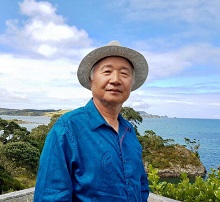Ilchi Lee
Ilchi Lee is a South Korean author, educator, and innovator in the fields of mind-body training and brain development. Born on December 23, 1950, in Cheonan, South Korea, Lee has dedicated his life to teaching others how to harness the power of their brains to create peace, happiness, and fulfillment in their lives and in the world. He is the founder of various mind-body training methods and organizations, including Brain Education, a comprehensive brain training program, and the Earth Citizen Organization, a non-profit that promotes global peace and sustainability.
Early Life and Education[edit | edit source]
Ilchi Lee was born in South Korea and, from a young age, showed a keen interest in the human mind and the potential for personal development. His early experiences led him to explore various spiritual and physical disciplines, which formed the foundation of his later work. Lee attended a local university, where he studied physical education, deepening his understanding of the connection between the body and mind.
Career[edit | edit source]
In the 1980s, Lee began to develop his unique approach to health and well-being, which eventually evolved into Brain Education. This system is based on the principle that by understanding and training the brain, individuals can unlock their innate potential and lead more successful and fulfilling lives. Lee's methods combine traditional Korean healing practices, modern neuroscience, and positive psychology.
Throughout his career, Lee has authored over 40 books on topics related to brain development, health, and spirituality. His works include "Brain Wave Vibration: Getting Back into the Rhythm of a Happy, Healthy Life," "The Call of Sedona: Journey of the Heart," and "Change: Realizing Your Greatest Potential." These publications have been translated into multiple languages, spreading Lee's teachings worldwide.
Organizations and Initiatives[edit | edit source]
Ilchi Lee's vision extends beyond individual well-being to include global peace and environmental sustainability. He founded the Earth Citizen Organization, which aims to foster a sense of responsibility and action towards the Earth and its inhabitants. Additionally, Lee established the Benjamin School for Character Education and the International Brain Education Association (IBREA), promoting his educational methods globally.
Philosophy and Impact[edit | edit source]
Lee's philosophy centers on the belief that the brain has unlimited potential and that by harnessing this potential, individuals can create positive change in their lives and in the world. His teachings emphasize self-discovery, the importance of connecting with nature, and the power of a positive mindset. Through his books, lectures, and programs, Lee has touched the lives of millions around the globe, encouraging them to live with greater health, happiness, and harmony.
Controversies[edit | edit source]
Like many figures in the wellness and self-improvement industry, Ilchi Lee has faced criticism and controversy. Some critics question the scientific validity of his methods, while others have raised concerns about the practices and financial aspects of his organizations. Despite these challenges, Lee continues to promote his vision of a healthier, more peaceful world through brain education and global citizenship.
Legacy[edit | edit source]
Ilchi Lee's contributions to the fields of mind-body wellness and brain education have left a lasting impact. His innovative approach to personal and global well-being has inspired a movement of individuals committed to living as conscious, Earth-centered citizens. As the world faces increasing challenges, Lee's message of hope, empowerment, and responsibility remains more relevant than ever.
Search WikiMD
Ad.Tired of being Overweight? Try W8MD's physician weight loss program.
Semaglutide (Ozempic / Wegovy and Tirzepatide (Mounjaro / Zepbound) available.
Advertise on WikiMD
|
WikiMD's Wellness Encyclopedia |
| Let Food Be Thy Medicine Medicine Thy Food - Hippocrates |
Translate this page: - East Asian
中文,
日本,
한국어,
South Asian
हिन्दी,
தமிழ்,
తెలుగు,
Urdu,
ಕನ್ನಡ,
Southeast Asian
Indonesian,
Vietnamese,
Thai,
မြန်မာဘာသာ,
বাংলা
European
español,
Deutsch,
français,
Greek,
português do Brasil,
polski,
română,
русский,
Nederlands,
norsk,
svenska,
suomi,
Italian
Middle Eastern & African
عربى,
Turkish,
Persian,
Hebrew,
Afrikaans,
isiZulu,
Kiswahili,
Other
Bulgarian,
Hungarian,
Czech,
Swedish,
മലയാളം,
मराठी,
ਪੰਜਾਬੀ,
ગુજરાતી,
Portuguese,
Ukrainian
Medical Disclaimer: WikiMD is not a substitute for professional medical advice. The information on WikiMD is provided as an information resource only, may be incorrect, outdated or misleading, and is not to be used or relied on for any diagnostic or treatment purposes. Please consult your health care provider before making any healthcare decisions or for guidance about a specific medical condition. WikiMD expressly disclaims responsibility, and shall have no liability, for any damages, loss, injury, or liability whatsoever suffered as a result of your reliance on the information contained in this site. By visiting this site you agree to the foregoing terms and conditions, which may from time to time be changed or supplemented by WikiMD. If you do not agree to the foregoing terms and conditions, you should not enter or use this site. See full disclaimer.
Credits:Most images are courtesy of Wikimedia commons, and templates, categories Wikipedia, licensed under CC BY SA or similar.
Contributors: Prab R. Tumpati, MD

